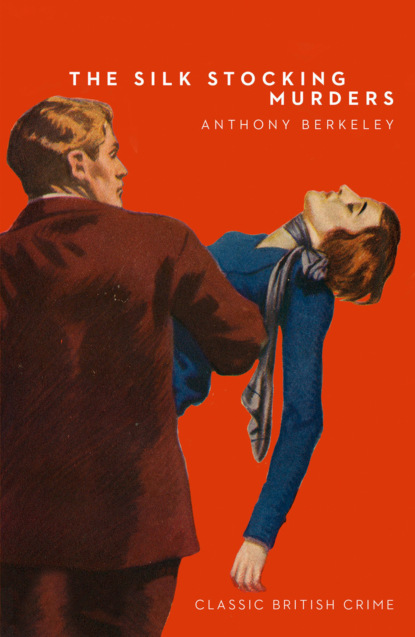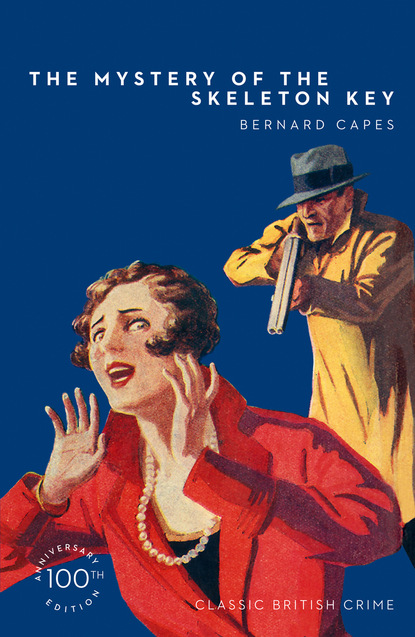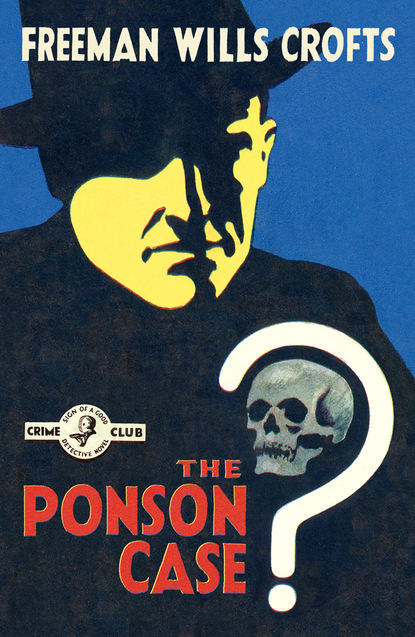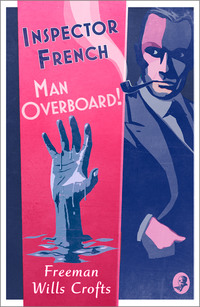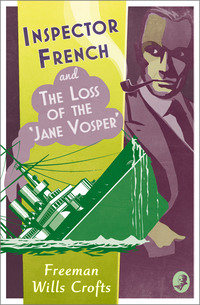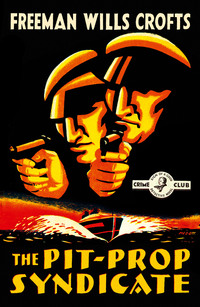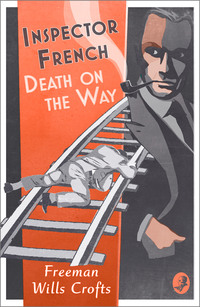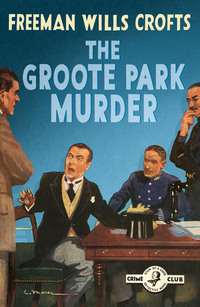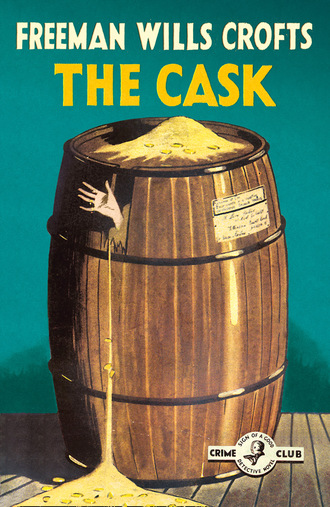
Полная версия
The Cask
‘I had found out that the Steam Navigation boat would be due on the following Monday, and on the preceding Saturday I brought the men and the dray to the shed and prepared them for what I wanted done. To enlist their help and prevent them becoming suspicious, I gave the former a qualified version of Le Gautier’s story. I told them I had made a bet and said I wanted their help to pull it off. A certain cask was coming in by the Rouen boat, addressed to a friend of mine, and he had bet me a large sum that I could not get this cask from the steamer people and take it to my house, while I held that I could. The point was to test the effectiveness of the ordinary business precautions. In order, I told the men, that no real trouble should arise and that I should not, in the event of failure, be charged with theft, my friend had given me a written authorisation to take the cask. This I had written out previously and I showed it to them. Finally, I promised them two pounds each if we succeeded.
‘I had got a couple of pots of quick-drying blue and white paint, and I altered the lettering on the dray to that of the address my Paris friend had put on the cask. I am skilful at this kind of work and I did it myself.
‘On Monday morning we drove to the docks, and I found the Bullfinch had just come in with the Paris goods aboard. She was discharging casks from the forehold, and I strolled along the wharf and had a look at the work. The casks coming ashore were wine-casks, but I noticed one at the side of the hold, over which one of the dockers and a young man who looked like a clerk were bending. They seemed very engrossed, and of course I wondered, “Is this my cask, and have they discovered the gold?” I spoke to the young man, found that the cask was mine, and asked him if I could get it away at once.
‘He was quite polite, but would not help me, referring me to the quay office and offering to take me there and find a clerk to attend to me. As we were leaving he called out to the man at the cask, “You understand, Harkness, to do nothing till you hear from Mr Avery.”
‘At the wharf office the young man left me in the outer office while he went, as he said, to get the proper clerk for my work. But he returned with a man that was evidently the manager, and I knew at once that something was wrong. This opinion was confirmed when the manager began raising objection after objection to letting the cask go.
‘Some judicious questions elicited the fact that “Mr Avery” was the managing director in the head office in Fenchurch Street. I left the wharf office, sat down on some boxes, and thought out the situation.
‘It was clear that something had aroused the suspicions of the clerk and the docker, Harkness, and the former’s remark to the latter to do nothing without instructions from Mr Avery seemed to mean that the matter was to be laid before that gentleman. To “do nothing” evidently meant to hold on to the cask. If I were to get my property it was clear I must see to the supplying of those instructions myself.
‘I went to Fenchurch Street and asked for Mr Avery. Fortunately for me he was engaged. I said I could not wait, and asked for a sheet of paper and envelope on which to write him a note. By the simple expedient of sealing and addressing the empty envelope, I thus provided myself with a sheet of paper bearing the firm’s heading.
‘I dropped into a bar and, ordering some ale, borrowed a pen and ink. Then I composed a letter from Mr Avery to Harkness, instructing him to hand over the cask at once to me.
‘While I was writing this it occurred to me that if this man’s suspicions were really seriously aroused, he would probably follow the cask and thus trace me to my house. I lost another quarter of an hour pondering this problem. Then an idea occurred to me, and I added a paragraph saying that as the Navigation Company had contracted to deliver the cask at an address in the city, he, Harkness, was to accompany it and see that it reached its destination safely.
‘I wrote the letter in the round hand of a junior clerk, signing it “The I. and C. S. N. Co., Ltd., per” in the same hand, and “Avery” with an undecipherable initial in another kind of writing, with another “per,” and then two not very clear initials. I hoped in this way to mislead Harkness, if he happened to know the genuine signature.
‘It was my design to get Harkness away from the ship with the cask and my own men, when I hoped to find some way of giving him the slip. This I eventually did by instructing one of the men to clamour for a drink, and the other, a man named Watty, to refuse to leave the horse when I invited the party to a bar for some beer. On the plea of relieving Watty, I left Harkness and the other man drinking in the bar, and slipped away with Watty and the dray. Then he and I went back to the shed and I ran a coat of paint over the dray, restoring it to its original brown and painting out the fictitious name. In the evening we brought the dray home, timing ourselves to arrive here after dark, and unloaded the cask in one of the out-houses, where it now is.’
When Felix ceased speaking, the two men sat in silence for several minutes while Burnley turned the statement over in his mind. The sequence of events was unusual, but the story hung together, and, as he went over it in detail, he could see no reason why it should not, from Felix’s point of view, be true. If Felix believed his friend’s letter, as he appeared to, his actions were accounted for, and if the cask really contained a statue, the letter might explain the whole thing. On the other hand, if it held a corpse, the letter was a fraud, to which Felix might or might not be party.
Gradually, as he pondered, the matter shaped itself into three main considerations.
First, there was Felix’s general bearing and manner. The Inspector had a long and varied experience of men who told the truth and of men who lied, and all his instincts led him to believe this man. He was aware that such instincts are liable to error—he had himself erred on more than one occasion in the past—yet he could not overlook the fact that Felix’s bearing, as far as his impression went, was that of a sincere and honest man. Such a consideration would not be a decisive factor in his conclusion, but it would undoubtedly weigh.
Secondly, there was Felix’s account of his actions in London. Of the truth of this the Inspector had already received considerable independent testimony. He reviewed the chain of events and was surprised to find how few statements of Felix were unsupported. His first visit to the Bullfinch had been described in almost similar terms by Broughton and by Huston in the wharf office. His call at the Fenchurch Street office and the ruse by which he obtained the shipping company’s headed notepaper had been testified to by Mr Avery and his chief clerk, Wilcox. His description of the letter he had written to Harkness was certainly accurate from the Inspector’s own knowledge. His account of the removal of the cask and the shaking off of Harkness was in agreement with the statement of the latter and finally, Felix’s description of the removal of the cask to its present resting place was fully corroborated by Constable Walker.
There was practically no part of the statement unsupported by outside evidence. In fact, Inspector Burnley could not recall any case where so much confirmation of a suspect’s story was forthcoming. Weighing the matter point by point, he came to the deliberate conclusion that he must unreservedly believe it.
So much for Felix’s actions in London. But there was a third point—his actions in Paris, culminating in the letter of his friend. The letter. That was the kernel of the nut. Was it really written under the circumstances described? Had Le Gautier written it? Was there even such a man as Le Gautier? All this, he thought, it should not be difficult to find out. He would get some more information from Felix and if necessary slip across to Paris and put the statements to the test. He broke the silence.
‘Who is M. Le Gautier?’
‘Junior partner in the firm of Le Gautier, Fils, wine merchants, in the rue Henri Quatre.’
‘And M. Dumarchez?’
‘A stockbroker.’
‘Can you give me his address?’
‘I don’t know his home address. His office is, I think, in the Boulevard Poissonière. But I could get you the address from M. Le Gautier.’
‘Please give me an account of your relations with these gentlemen.’
‘Well, I have known them both for years and we are good friends, but I cannot recall ever having had any money transactions with either until this matter of the lottery.’
‘The details of that mentioned in the letter are correct?’
‘Oh, perfectly.’
‘Can you remember where precisely the conversation about the lottery took place?’
‘It was in the ground floor room of the café, at the window to the right of the entrance, looking inwards.’
‘You say other gentlemen were present?’
‘Yes, a group of us were there and the conversation was general.’
‘Was your arrangement to enter the lottery heard by the group?’
‘Yes, we had quite a lot of good-natured chaff about it.’
‘And can you remember who were present?’
Mr Felix hesitated.
‘I’m not sure that I can,’ he said at last. ‘The group was quite a casual one and I only joined it for a few moments. Le Gautier was there, of course, and a man called Daubigny, and Henri Boisson, and, I think, Jaques Rôget, but of him I’m not sure. There were a number of others also.’
Felix answered the questions readily and the Inspector noted his replies. He felt inclined to believe the lottery business was genuine. At all events inquiries in Paris would speedily establish the point. But even if it was all true, that did not prove that Le Gautier had written the letter. A number of people had heard the conversation, and any one could have written it, even Felix himself. Ah, that was an idea! Could Felix be the writer? Was there any way of finding that out? The Inspector considered and then spoke again.
‘Have you the envelope this letter came in?’
‘Eh?’ said Felix, ‘the envelope? Why, no, I’m sure I haven’t. I never keep them.’
‘Or the card?’
Felix turned over the papers on his desk and rummaged in the drawers.
‘No,’ he answered, ‘I can’t find it. I must have destroyed it too.’
There was then no proof that these communications had been received by Felix. On the other hand there was no reason to doubt it. The Inspector kept an open mind as he turned again to the letter.
It was typewritten on rather thin, matt surfaced paper and, though Burnley was not an expert, he believed the type was foreign. Some signs of wear were present which he thought might identify the typewriter. The n’s and the r’s were leaning slightly to the right, the t’s and the e’s were below alignment, and the l’s had lost the horizontal bar at the top of the downstroke. He held the paper up to the light. The watermark was somewhat obscured by the type, but after a time he made it out. It was undoubtedly French paper. This, of course, would not weigh much, as Felix by his own statement, was frequently in Paris, but still it did weigh.
The Inspector read the letter again. It was divided into four paragraphs and he pondered each in turn. The first was about the lottery. He did not know much about French lotteries, but the statements made could at least be verified. With the help of the French police it would be easy to find out if any drawings and payments had recently been made, and he could surely get a list of the winners. A winner of 50,000 francs, living in or near Paris, should be easily traced.
The second and third paragraphs were about the bet and the sending of the cask. Burnley turned the details over in his mind. Was the whole story a likely one? It certainly did not strike him as such. Even if such an unusual bet had been made, the test was an extremely poor one. He could hardly believe that a man who could invent the plan of the cask would not have done better. And yet it was undoubtedly possible.
Another idea entered the Inspector’s mind. He had, perhaps, been thinking too much of the £988, and too little of the woman’s hand. Suppose there really was a corpse in the cask. What then?
Such an assumption made all the circumstances more serious and explained partly the sending of the cask, but it did not, so far as the Inspector could see, throw light on the method of doing so. But when he came to the fourth paragraph he saw that it might easily bear two meanings. He read it again:
‘I send you my best congratulations on the greatness of your coup, of which the visible evidence goes to you in the cask, and my only regret is that I shall be unable to be present to see you open it.’
This seemed at first sight obviously to mean congratulations on winning the lottery, the ‘visible evidence’ of which, namely £988 in gold, was in the cask. But did it really mean this? Did a more sinister interpretation not also offer itself? Suppose the body was the ‘visible evidence’? Suppose the death was the result, possibly indirect, of something that Felix had done? If money only was being sent, why should Le Gautier experience regret that he could not see the cask opened? But if a corpse was unexpectedly hidden there, would not that statement be clarified? It certainly looked so. One thing at least seemed clear. If a corpse had been sent to Felix, he must know something of the circumstances leading up to it. The Inspector spoke again:
‘I am obliged for your statement, Mr Felix, which, I may be allowed to say, I fully accept so far as it goes. But I fear you have not told me everything?’
‘I have told you everything material.’
‘Then I am afraid we are not in agreement as to what is material. At all events, it all goes back to my original question, “What is in the cask?”’
‘Do you not accept my statement that it is money?’
‘I accept your statement that you believe it to be money. I do not necessarily accept your authority for that belief.’
‘Well,’ said Felix, jumping up, ‘the cask’s in the coach-house and I see there is nothing for it but to go and open it now. I did not want to do so tonight, as I did not want to have all that gold lying loose about the house, but it’s clear nothing else will satisfy you.’
‘Thank you, Mr Felix, I wanted you to make the suggestion. It is, as you say, the only way to settle the matter. I’ll call Sergeant Hastings here as a witness and we’ll go now.’
In silence, Felix got a lantern and led the way. They passed through a back-door into the yard and paused at the coach-house door.
‘Hold the light, will you, while I get the keys.’ Burnley threw a beam on the long running bolt that closed the two halves of the door. A padlock held the handle down on the staple. Felix inserted a key, but at his first touch the lock fell open.
‘Why, the thing’s not fastened!’ he cried, ‘and I locked it myself a few hours ago!’
He removed the padlock and withdrew the running bolt, swinging the large door open. Burnley flashed in the lantern.
‘Is the cask here?’ he said.
‘Yes, swinging there from the ceiling,’ answered Felix, as he came over from fastening back the door. Then his jaw dropped and he stared fixedly.
‘My heavens!’ he gasped, in a strangled tone, ‘it’s gone! The cask’s gone!’
CHAPTER VI
THE ART OF DETECTION
ASTONISHED as Burnley was himself at this unexpected development, he did not forget to keep a keen watch on Felix. That the latter was genuinely amazed and dumbfounded he could not doubt. Not only was his surprise too obviously real to be questioned, but his anger and annoyance at losing his money were clearly heartfelt.
‘I locked it myself. I locked it myself,’ he kept on repeating. ‘It was there at eight o’clock, and who could get at it since then? Why, no one but myself knew about it. How could any one else have known?’
‘That’s what we have to find out,’ returned the Inspector. ‘Come back to the house, Mr Felix, and let us talk it over. We cannot do anything outside until it gets light.
‘You may not know,’ he continued, ‘that you were followed here with your cask by one of our men, who watched you unloading it in the coach-house. He waited till you left with your friend Martin, a few minutes before nine. He then had to leave to advise me of the matter, but he was back at the house by ten. From ten till after eleven he watched alone, but since then the house has been surrounded by my men, as I rather expected to find a gang instead of a single man. Whoever took the cask must therefore have done so between nine and ten.’
Felix stared at his companion open-mouthed.
‘By Jove!’ he said. ‘You amaze me. How in thunder did you get on my track?’
Burnley smiled.
‘It is our business to know these things,’ he answered. ‘I knew all about how you got the cask away from the docks also.’
‘Well, thank Heaven! I told you the truth.’
‘It was the wise thing, Mr Felix. I was able to check your statements as you went along, and I may say I felt really glad when I heard you were going to be straight. At the same time, sir, you will realise that my orders prevent me being satisfied until I have seen the contents of the cask.’
‘You cannot be more anxious to recover it than I am, for I want my money.’
‘Naturally,’ said Burnley, ‘but before we discuss the matter excuse me a moment. I want to give my fellows some instructions.’
He went out and called the men together. Sergeant Hastings and Constable Walker he retained, the rest he sent home in the car with instructions to return at eight o’clock in the morning. To Broughton he bade ‘Good-night,’ thanking him for his presence and help.
When he re-entered the study Felix made up the fire and drew forward the whisky and cigars.
‘Thank you, I don’t mind if I do,’ said the detective, sinking back into his chair. ‘Now, Mr Felix, let us go over every one that knew about the cask being there.’
‘No one but myself and the carter, I assure you.’
‘Yourself, the carter, myself, and my man Walker—four to start with.’
Felix smiled.
‘As far as I am concerned,’ he said, ‘I left here, as you appear to know, almost immediately after the arrival of the cask and did not return till after one o’clock. All of that time I was in the company of Dr William Martin and a number of mutual friends. So I can prove an alibi.’
Burnley smiled also.
‘For me,’ he said, ‘I am afraid you will have to take my word. The house was watched by Walker from ten o’clock, and we may take it as quite impossible that anything could have been done after that hour.’
‘There remains therefore the carter.’
‘There remains therefore the carter, and, as we must neglect no possibilities, I will ask you to give me the address of the cartage firm and any information about the man that you may have.’
‘John Lyons and Son, 127 Maddox Street, Lower Beechwood Road, was the contractor. The carter’s name, beyond Watty, I don’t know. He was a rather short, wiry chap, with a dark complexion and small black moustache.’
‘And now, Mr Felix, can you not think of any others who may have known about the cask?’
‘There was no one,’ replied the other with decision.
‘I’m afraid we can’t assume that. We certainly can’t be sure.’
‘Who could there be?’
‘Well, your French friend. How do you know he didn’t write to others beside you?’
Felix sat up as if he had been shot.
‘By Jove!’ he cried, ‘it never entered my head. But it’s most unlikely—most unlikely.’
‘The whole thing’s most unlikely as far as that goes. Perhaps you are not aware that someone else was watching the house last evening?’
‘Good God, Inspector! What do you mean?’
‘Someone came to the lane shortly after your arrival with the cask. He waited and heard your conversation with your friend Martin. When you and your friend left, he followed you.’
Felix passed his hand over his forehead. His face was pale.
‘This business is too much for me,’ he said. ‘I wish to heaven I was out of it.’
‘Then help me to get you out of it. Think. Is there any one your friend knows that he might have written to?’
Felix remained silent for some moments.
‘There is only one man,’ he said at length in a hesitating voice, ‘that I know he is friendly with—a Mr Percy Murgatroyd, a mining engineer who has an office in Westminster. But I don’t for one moment believe he had anything to say to it.’
‘Let me have his name and address, anyway.’
‘4 St John’s Mansions, Victoria Street,’ said Felix, on referring to an address book.
‘You might write it down, if you please, and sign it.’
Felix looked up with a smile.
‘You generally write notes yourself, I should have thought?’
Burnley laughed.
‘You’re very quick, Mr Felix. Of course it’s your handwriting I want also. But I assure you it’s only routine. Now please, think. Is there any one else?’
‘Not a living soul that I know of.’
‘Very well, Mr Felix. I want to ask just one other question. Where did you stay in Paris?’
‘At the Hotel Continental.’
‘Thanks, that’s everything. And now, if you will allow me, I will take a few winks here in the chair till it gets light, and if you take my advice you will turn in.’
Felix looked at his watch.
‘Quarter-past three. Well, perhaps I shall. I’m only sorry I cannot offer you a bed as the house is absolutely empty, but if you will take a shakedown in the spare room—?’
‘No, no, thanks very much, I shall be all right here.’
‘As you wish. Good-night.’
When Felix had left, the Inspector sat on in his chair smoking his strong black cigars and thinking. He did not sleep, though he remained almost motionless, only at long intervals rousing up to light another cigar, and it was not until five had struck that he got up and looked out of the window.
‘Light at last,’ he muttered, as he let himself quietly out of the back door into the yard.
His first care was to make a thorough search in the yard and all the out-houses to ensure that the cask was really gone and not merely hidden in some other room. He was speedily satisfied on this point.
Since it was gone it was obvious that it must have been removed on a vehicle. His next point was to see how that vehicle got in, and if it had left any traces. And first as to the coach-house door.
He picked up the padlock and examined it carefully. It was an ordinary old-fashioned four-inch one. The ring had been forced open while locked, the hole in the opening end through which the bolt passes being torn away. Marks showed that this had been done by inserting some kind of lever between the body of the lock and the staple on the door, through which the ring had been passed. The Inspector looked round for the lever, but could not find it. He therefore made a note to search for such a tool, as if it bore marks which would fit those on the door, its evidence might be important.
There was next the question of the yard gate. This opened inwards in two halves, and was fastened by a wooden beam hinged through the centre to the edge of one of the half gates. When it was turned vertically the gates were free, but when horizontally it engaged with brackets, one on each half gate, thus holding them closed. It could be fastened by a padlock, but none was fitted. The gate now stood closed and with the beam lying in the brackets.
The Inspector took another note to find out if Mr Felix had locked the beam, and then stood considering. It was clear the gate must have been closed from the inside after the vehicle had gone out. It must have been opened similarly on the latter’s arrival. Who had done this? Was Felix lying, and was there some one else in the house?
At first it seemed likely, and then the Inspector thought of another way. Constable Walker had climbed the wall. Why should not the person who opened and shut the gate have also done so? The Inspector moved slowly along the wall scrutinising it and the ground alongside it.


